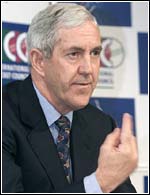Condon calls for player education to beat match-fixing
International cricket's corruption policeman has called for specific training and education for young players around the world to combat match-fixing.
Sir Paul Condon, head of the International Cricket Council's anti-corruption unit, said this would be the key recommendation of his interim report into the match-fixing crisis.
"There are some important things we must do to ensure players, particularly young ones, coming on to the international scene, realise the opportunity for corruption and how they can become sucked into it," Condon told BBC World Service's Sportsworld programme in an interview to be broadcast on Saturday.
 "For me, the most important thing is to help restore the faith in the game for millions of followers around the world.
"For me, the most important thing is to help restore the faith in the game for millions of followers around the world.
"What happens on the field should be about skill, courage, luck and endeavour, not about seedy deals with bookmakers, mobile phones and the fixing of matches for betting purposes."
Condon, who is due to deliver his interim report later this month, wants to see the ICC adopt a "courageous and robust" approach and some of his recommendations focus on increasing the awareness of players to avoid being lured into compromising positions.
He also wants to see increased security around the teams to prevent players unknowingly being approached by bookmakers.
"I will hopefully be giving the ICC a package of recommendations which, if implemented, will clean up the game," he said.
"There is some fairly strong advice on implementation to make sure all this is in place and done and dusted before the next World Cup in South Africa (in 2003).
"There is an opportunity for, in two or three years' time, people to be able to look back and say this was a difficult and damaging time for the game but that a line was drawn under it and cricket has moved on and prospered."
Condon was speaking on the first anniversary of the match-fixing scandal triggered last year by former South African captain Hansie Cronje.